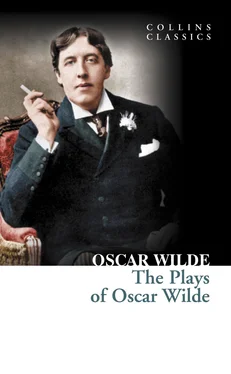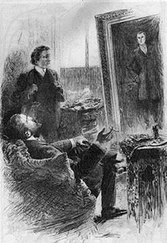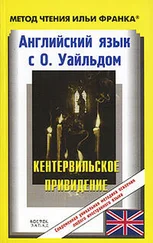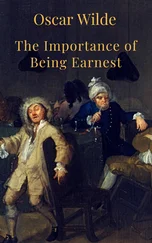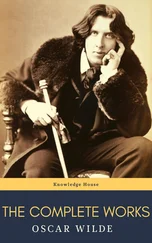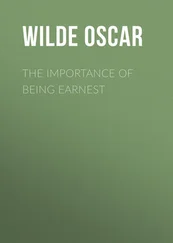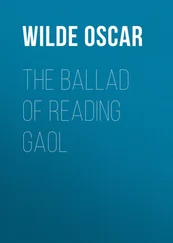LADY CAROLINE: If they are not married, they would be looking after a wife. It’s perfectly scandalous the amount of bachelors who are going about society. There should be a law passed to compel them all to marry within twelve months.
LADY STUTFIELD ( refuses coffee ): But if they’re in love with some one who, perhaps, is tied to another?
LADY CAROLINE: In that case, Lady Stutfield, they would be married off in a week to some plain respectable girl, in order to teach them not to meddle with other people’s property.
MRS. ALLONBY: I don’t think that we should ever be spoken of as other people’s property. All men are married women’s property. That is the only true definition of what married women’s property really is. But we don’t belong to any one.
LADY STUTFIELD: Oh, I am so very, very glad to hear you say so.
LADY HUNSTANTON: But do you really think, dear Caroline, that legislation would improve matters in any way? I am told that, nowadays, all the married men live like bachelors, and all the bachelors like married men.
MRS. ALLONBY: I certainly never know one from the other.
LADY STUTFIELD: Oh, I think one can always know at once whether a man has home claims upon his life or not. I have noticed a very, very sad expression in the eyes of so many married men.
MRS. ALLONBY: Ah, all that I have noticed is that they are horribly tedious when they are good husbands, and abominably conceited when they are not.
LADY HUNSTANTON: Well, I suppose the type of husband has completely changed since my young days, but I’m bound to state that poor dear Hunstanton was the most delightful of creatures, and as good as gold.
MRS. ALLONBY: Ah, my husband is a sort of promissory note; I’m tired of meeting him.
LADY CAROLINE: But you renew him from time to time, don’t you?
MRS. ALLONBY: Oh no, Lady Caroline. I have only had one husband as yet. I suppose you look upon me as quite an amateur.
LADY CAROLINE: With your views on life I wonder you married at all.
MRS. ALLONBY: So do I.
LADY HUNSTANTON: My dear child, I believe you are really very happy in your married life, but that you like to hide your happiness from others.
MRS. ALLONBY: I assure you I was horribly deceived in Ernest.
LADY HUNSTANTON: Oh, I hope not, dear. I knew his mother quite well. She was a Stratton, Caroline, one of Lord Crowland’s daughters.
LADY CAROLINE: Victoria Stratton? I remember her perfectly. A silly, fair-haired woman with no chin.
MRS. ALLONBY: Ah, Ernest has a chin. He has a very strong chin, a square chin. Ernest’s chin is far too square.
LADY STUTFIELD: But do you really think a man’s chin can be too square? I think a man should look very, very strong, and that his chin should be quite, quite square.
MRS. ALLONBY: Then you should certainly know Ernest, Lady Stutfield. It is only fair to tell you beforehand he has got no conversation at all.
LADY STUTFIELD: I adore silent men.
MRS. ALLONBY: Oh, Ernest isn’t silent. He talks the whole time. But he has got no conversation. What he talks about I don’t know. I haven’t listened to him for years.
LADY STUTFIELD: Have you never forgiven him then? How sad that seems! But all life is very, very sad, is it not?
MRS. ALLONBY: Life, Lady Stutfield, is simply a mauvais quart d’heure made up of exquisite moments.
LADY STUTFIELD: Yes, there are moments, certainly. But was it something very, very wrong that Mr. Allonby did? Did he become angry with you, and say anything that was unkind or true?
MRS. ALLONBY: Oh, dear, no. Ernest is invariably calm. That is one of the reasons he always gets on my nerves. Nothing is so aggravating as calmness. There is something positively brutal about the good temper of most modern men. I wonder we women stand it as well as we do.
LADY STUTFIELD: Yes; men’s good temper shows they are not so sensitive as we are, not so finely strung. It makes a great barrier often between husband and wife, does it not? But I would so much like to know what was the wrong thing Mr. Allonby did.
MRS. ALLONBY: Well, I will tell you, if you solemnly promise to tell everybody else.
LADY STUTFIELD: Thank you, thank you. I will make a point of repeating it.
MRS. ALLONBY: When Ernest and I were engaged, he swore to me positively on his knees that he had never loved any one before in the whole course of his life. I was very young at the time, so I didn’t believe him, I needn’t tell you. Unfortunately, however, I made no inquiries of any kind till after I had been actually married four or five months. I found out then that what he had told me was perfectly true. And that sort of thing makes a man so absolutely uninteresting.
LADY HUNSTANTON: My dear!
MRS. ALLONBY: Men always want to be a woman’s first love. That is their clumsy vanity. We women have a more subtle instinct about things. What we like is to be a man’s last romance.
LADY STUTFIELD: I see what you mean. It’s very, very beautiful.
LADY HUNSTANTON: My dear child, you don’t mean to tell me that you won’t forgive your husband because he never loved any one else? Did you ever hear such a thing, Caroline? I am quite surprised.
LADY CAROLINE: Oh, women have become so highly educated, Jane, that nothing should surprise us nowadays, except happy marriages. They apparently are getting remarkably rare.
MRS. ALLONBY: Oh, they’re quite out of date.
LADY STUTFIELD: Except amongst the middle classes, I have been told.
MRS. ALLONBY: How like the middle classes!
LADY STUTFIELD: Yes – is it not? – very, very like them.
LADY CAROLINE: If what you tell us about the middle classes is true, Lady Stutfield, it redounds greatly to their credit. It is much to be regretted that in our rank of life the wife should be so persistently frivolous, under the impression apparently that it is the proper thing to be. It is to that I attribute the unhappiness of so many marriages we all know of in society.
MRS. ALLONBY: Do you know, Lady Caroline, I don’t think the frivolity of the wife has ever anything to do with it. More marriages are ruined nowadays by the common sense of the husband than by anything else. How can a woman be expected to be happy with a man who insists on treating her as if she was a perfectly rational being?
LADY HUNSTANTON: My dear!
MRS. ALLONBY: Man, poor, awkward, reliable, necessary man belongs to a sex that has been rational for millions and millions of years. He can’t help himself. It is in his race. The History of Woman is very different. We have always been picturesque protests against the mere existence of common sense. We saw its dangers from the first.
LADY STUTFIELD: Yes, the common sense of husbands is certainly most, most trying. Do tell me your conception of the Ideal Husband. I think it would be so very, very helpful.
MRS. ALLONBY: The Ideal Husband? There couldn’t be such a thing. The institution is wrong.
LADY STUTFIELD: The Ideal Man, then, in his relations to us .
LADY CAROLINE: He would probably be extremely realistic.
MRS. ALLONBY: The Ideal Man! Oh, the Ideal Man should talk to us as if we were goddesses, and treat us as if we were children. He should refuse all our serious requests, and gratify every one of our whims. He should encourage us to have caprices, and forbid us to have missions. He should always say much more than he means, and always mean much more than he says.
LADY HUNSTANTON: But how could he do both, dear?
MRS. ALLONBY: He should never run down other pretty women. That would show he had no taste, or make one suspect that he had too much. No; he should be nice about them all, but say that somehow they don’t attract him.
LADY STUTFIELD: Yes, that is always very, very pleasant to hear about other women.
Читать дальше
